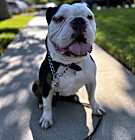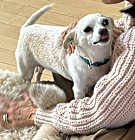Gordon Setters are large dogs, weighing 44 to 83 pounds and standing 25 to 26 inches tall on average.
Gordon Setter
Breed Type: Sporting
Common nicknames: Gordon
Coat: Double
Hypoallergenic: No, they will likely trigger allergies.
Temperament: Devoted, energetic, smart, affectionate
Life expectancy: 12-13 years
Color & patterns: Black and red

The Gordon Setter, a breed known for their striking glossy black coats and rich tan markings, is a wonderful choice for those seeking a loyal and active pup. Known for their sporting prowess, Gordon Setters excel in activities that keep their minds and bodies active. These dogs have a mischievous streak that may occasionally lead them astray, so a bit of patience and consistent training are the secret ingredients to living with this breed. Despite their energetic nature, Gordon Setters also have a gentle and affectionate side and form strong bonds with their families. Their boundless energy and cheeky nature make them great partners in crime for children, and they’ll happily engage in games of chase, fetch, and even hide-and-seek. While they may have a penchant for adventure and the occasional tendency to be “selective listeners,” Gordon Setters make excellent family dogs for those who are prepared to match their high energy levels and provide them with mental stimulation.
Gordon Setter characteristics
Learn about about Gordon Setter basics like their fur colors, shedding levels, how much grooming they need, and other Gordon Setter facts.
Average height
25-26 inches (63.5-66.0cm)
Average weight
44-83 pounds (20.0-37.6 kg)
Average lifespan
12-13 years
Exercise needs
Grooming needs
Full-grown size
Good with cats
Good with kids
Training aptitude
When do Gordon Setters stop growing?
Gordon Setters stop growing between 18 and 24 months. They will continue to fill out and develop muscle mass until they are about two years old. Regular exercise and a balanced diet will encourage healthy development.
Can Gordon Setters be all black?
No, to meet official breed standards, Gordon Setters should have a black coat with well-defined tan markings on their eyebrows, cheeks, legs, and under the tail. If you encounter a Gordon Setter who is all black, they are likely not purebred or may have mixed ancestry. Of course, the color of a dog’s coat has no bearing on their personality or well-being.
What colors do Gordon Setters come in?
Gordon Setters should have a rich black coat with well-defined tan markings on their eyebrows, cheeks, legs, and under the tail, according to breed standards.
How much do Gordon Setters shed?
Gordon Setters are moderate to heavy shedders. Their dense, glossy coat with feathering on their legs, tail, and belly requires frequent brushing to avoid matting. Two to three times a week should do the trick. They’ll also need a trim every few months or so.
Do Gordon Setters have hair or fur?
Gordon Setters have fur, not hair. Their coat is a dense, double-layered fur that includes a soft undercoat and longer, feathered outer coat. This fur provides insulation and protection, which was helpful to their original purpose as hunting dogs. The feathering on their legs, tail, and belly contributes to their distinctive appearance.
Gordon Setter temperament
Learn about about the Gordon Setter temperament and how well they fit into your lifestyle, home environment, and family.
Are Gordon Setters good with kids?
Yes, Gordon Setters are good with kids. They are both gentle and protective of children and love to play, making them truly marvelous companions for kids.
As with any breed, it is recommended that your child is always supervised when interacting with your dog to keep both the child and dog safe. Teaching children how to properly approach and handle dogs is crucial to ensure positive experiences for both the dog and the child, as is teaching dogs how to interact gently with children.
Are Gordon Setters good with cats?
Yes, Gordon Setters can be good with cats if they’re introduced to a feline friend at a young age and/or well-socialized with cats. Keep in mind that Gordon Setters have a strong prey drive due to their history as hunting dogs, so introduce them to cats carefully and gradually. With proper introductions and training, Gordon Setters can live happily with cats.
Are Gordon Setters good with other dogs?
Yes, Gordon Setters are good with other dogs, especially when properly socialized. Gordon Setters are friendly and sociable by nature, and their easy-going temperament makes them well-suited to a multi-dog household. Their temperament and sociable nature generally make them adaptable in multi-dog households, although every individual Gordon Setter has a unique personality.
Do Gordon Setters bark a lot?
No, Gordon Setters don’t bark a lot. This breed barks to alert, but is not excessively vocal. As with any dog, they can be discouraged from barking with proper training and exercise.
Are Gordon Setters good family dogs?
Yes, Gordon Setters are good family dogs — some would call them excellent. Gordon Setters have been cherished as wonderful family companions for centuries in the United Kingdom. Gordon Setters are wildly devoted to their family members, although sometimes a little shy or wary around strangers. They are energetic and do require some daily activity to stay happy. With the right care and environment, a Gordon Setter will be a loving, reliable companion for families.
Are Gordon Setters easy to train?
Yes, Gordon Setters are relatively easy to train, given their intelligence and eagerness to please. They do have a stubborn streak, though, and will respond well to clear, firm commands. They also enjoy having a job to do, which makes training more engaging for them. Positive reinforcement also works well with these devoted pups. Keep training sessions short, fun, and rewarding to maintain your Gordon Setter’s interest and enthusiasm.
Just keep in mind that even if a certain dog breed is known to be easy to train, training any dog requires a long-term commitment.
How smart are Gordon Setters?
Gordon Setters are very smart. Their intelligence is on display in their ease of learning commands, solving problems, and performing tasks. They were originally bred for hunting and retrieving, which requires both mental and physical agility.
Are Gordon Setters cuddly?
Yes, Gordon Setters cuddly. These affectionate pups typically enjoy being close to their family members and seek out attention and physical closeness.
Are Gordon Setters friendly?
Yes, Gordon Setters are friendly and outgoing. Affectionate with their family members, the Gordon Setters’ affability to both people and animals makes them an easy companion in a variety of social settings.
Gordon Setter history
Learn about where this Gordon Setter came from!
Where are Gordon Setters from?
Gordon Setters are from Scotland. They were developed in the 17th century by the fourth Duke of Gordon, an avid hunter in search of a versatile gundog who could excel in retrieving game. The Gordon Setter is one of the oldest setter breeds.
How long do Gordon Setters live?
Gordon Setters live 12 to 13 years on average. Like all breeds, their longevity is influenced by genetics, overall health, diet, and activity. Regular veterinary check-ups and a healthy lifestyle can help them live a full and happy life.
Gordon Setter health
Learn about about the Gordon Setter health outlook and what diseases they may be prone to at various stages of their life.
Do Gordon Setters have health issues?
Gordon Setters are generally healthy but, like all breeds, may be prone to certain diseases and health issues.
What diseases are Gordon Setters prone to?
Gordon Setters may be prone to the following diseases:
Hip and/or elbow dysplasia: Hip and elbow dysplasia are two of the most common skeletal diseases seen in dogs. They are similar diseases in which either the hip or elbow joint has grown abnormally or is misshapen. The abnormal shape prevents the joints and sockets from adequately meeting one another, resulting in rubbing and grinding instead of sliding smoothly. Though the main complication with hip dysplasia is joint instability, the abnormalities present in elbow dysplasia often result in pieces of bone and/or cartilage breaking loose and irritating the joint tissues. Over time, the rubbing from dysplasia can cause a variety of issues, such as pain, lameness, and secondary osteoarthritis. Surgery can fix the joint if diagnosed before the onset of arthritis. If you are rescuing a Gordon Setter, have them checked out by a vet to see if they are prone to getting dysplasia.
Eye issues: Gordon Setters are susceptible to progressive retinal atrophy (PRA), a progressive degenerative disease affecting the retina that eventually leads to blindness, and cataracts, a common eye condition that causes cloudiness in the eye and obstructs vision.
Hypothyroidism: This thyroid malfunction results in low hormone production and could cause obesity, low energy, and a brittle coat.
Gastric dilatation-volvulus: This is a sudden, painful, and life-threatening swelling and twisting of the abdomen.
To identify some of these issues, a veterinarian may recommend hip, eye, and joint tests for the dog.
Are Gordon Setters hypoallergenic?
No, Gordon Setters are not hypoallergenic. They have a long, glossy coat that sheds moderately throughout the year. Their feathered coats produce dander. But remember, no dog breed is completely hypoallergenic. If you're concerned about allergies, spend time with a Gordon Setter to see how you react before bringing one into your home for good.
Popular Gordon Setter mixes
A few common Gordon Setter breed mixes include:
Gordon Setter Labrador (Gordon Setter + Labrador)
Setterdoodle (Gordon Setter + Poodle)
Gordon Retriever (Gordon Setter + Golden Retriever)

Find Gordon Setter puppies near you
Adopting a Gordon Setter
We don't see any Gordon Setters available for adoption in your exact location or cities near you, but here are some adorable similar breeds in Beverly Hills, CA.

RICO
Labrador Retriever
Male, 3 yrs 10 mos
Beverly Hills, CA
Good with dogs
Not good with cats
House-trained
Spayed or Neutered
Shots are up-to-date

Jesse
English Springer Spaniel Cocker Spaniel
Male, young
Los Angeles, CA
Not good with dogs
Not good with cats
Needs experienced adopter
House-trained
Spayed or Neutered
Shots are up-to-date

Mike
Labrador Retriever
Male, 3 yrs 2 mos
West Hollywood, CA
Good with dogs
Not good with cats
House-trained
Spayed or Neutered
Shots are up-to-date

Tucker
Golden Retriever
Male, 6 yrs 1 mo
West Hollywood, CA
Good with dogs
Not good with cats
House-trained
Spayed or Neutered
Shots are up-to-date

Hershey
American Bulldog
Female, 4 yrs 3 mos
West Hollywood, CA
Not good with dogs
Not good with cats
Needs experienced adopter
House-trained
Spayed or Neutered
Shots are up-to-date

Rory
Chihuahua
Female, 3 yrs 1 mo
West Hollywood, CA
Good with dogs
Good with cats
House-trained
Spayed or Neutered
Shots are up-to-date

Lucky
Belgian Shepherd Nova Scotia Duck-Tolling Retriever
Male, 1 yr 1 mo
West Hollywood, CA
Good with dogs
Not good with cats
Spayed or Neutered
Shots are up-to-date

Joey
Poodle (Miniature)
Male, 1 yr 11 mos
West Hollywood, CA
Not good with dogs
Not good with cats
Spayed or Neutered
Shots are up-to-date

RICO
Labrador Retriever
Male, 3 yrs 10 mos
Beverly Hills, CA
Good with dogs
Not good with cats
House-trained
Spayed or Neutered
Shots are up-to-date

Jesse
English Springer Spaniel Cocker Spaniel
Male, young
Los Angeles, CA
Not good with dogs
Not good with cats
Needs experienced adopter
House-trained
Spayed or Neutered
Shots are up-to-date

Mike
Labrador Retriever
Male, 3 yrs 2 mos
West Hollywood, CA
Good with dogs
Not good with cats
House-trained
Spayed or Neutered
Shots are up-to-date

Tucker
Golden Retriever
Male, 6 yrs 1 mo
West Hollywood, CA
Good with dogs
Not good with cats
House-trained
Spayed or Neutered
Shots are up-to-date

Hershey
American Bulldog
Female, 4 yrs 3 mos
West Hollywood, CA
Not good with dogs
Not good with cats
Needs experienced adopter
House-trained
Spayed or Neutered
Shots are up-to-date

Rory
Chihuahua
Female, 3 yrs 1 mo
West Hollywood, CA
Good with dogs
Good with cats
House-trained
Spayed or Neutered
Shots are up-to-date




